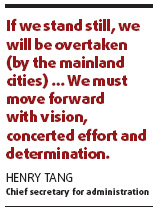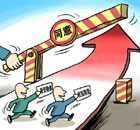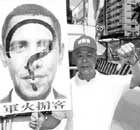Top Biz News
HK eyes big role developing China
By Joseph Li (China Daily)
Updated: 2010-01-13 07:54
 |
Large Medium Small |
Hong Kong can jump on the mainland's economic bandwagon if the country continues to enjoy consistent, fast economic growth, Henry Tang, chief secretary for the administration of the Hong Kong special administrative region, told China Daily in an exclusive interview.

As China formulates its 12th Five-Year Plan (2011-15), Tang revealed Hong Kong has been in discussions with the National Development and Reform Commission in the hope that Hong Kong can position itself and seize opportunities arising from the country's robust development.
Compared with cities on the mainland, Hong Kong still has a competitive edge in its legal system and its intellectual property rights protection in the areas of finance, technology and creative industries.
However, as the mainland is developing very rapidly, Tang cautions that Hong Kong has no room for complacency.
Hong Kong has played an active role in the past 30 years during China's reform and opening-up.
If China's rapid growth continues, Hong Kong can move closer to economic integration with the mainland and explore new opportunities to further complement each other's strengths, Tang said.
"We are hoping for a synergy of 'one plus one is more than two'.
"If we take a look at the world's developing economies, the service sector constitutes at least 50 to 60 percent of their economies. But the volume of the mainland's service sector is less than 50 percent of its economy. This means there is a lot of room for further development.
"Given the mainland's service sector will grow significantly in the future, I envisage they will seize the opportunity to raise the quality of their service industry," Tang said.
Hong Kong made major contributions to the improvement of the mainland's primary industries 30 years ago by providing capital and management expertise, he recalled.
"Hong Kong can make further contributions to this new era of development," he predicted.
On the question of the rapid development of mainland cities that are closing the gap with Hong Kong, Tang stressed that development is necessary for any big city.
"If we stand still, we will be overtaken (by the mainland cities)," he warned. "We must move forward with vision, concerted effort and determination.
"That's why we are pushing forward major infrastructure projects, including the regional express rail link project. The government is pushing ahead the express rail link project because it is so vital to the economic development and the mutual development of the mainland and Hong Kong."
On the frequently discussed competition between Hong Kong and Shanghai, Tang described them as two cities within one country that interact with and complement each other.
Taking the new Disney theme park in Shanghai as an example, he said China, with a population of 1.3 billion, has a big enough market to accommodate two such theme parks.
"We have different customers," he said, "just like we have our own customers in other business areas. Hong Kong and Shanghai are both Chinese cities that should complement each other and develop together, for we realize that if the country flourishes, both cities will flourish."
He added, however: "Hong Kong should not underestimate (the competition from Shanghai) and should strive to reduce internal struggles that exhaust our energy."
When asked how long it will take for Shanghai to be on par with Hong Kong, Tang laughed.
"It is comparing apples and oranges," he said. "Within one country, Hong Kong enjoys the advantage of 'two systems', but Shanghai has the 'national treatment' advantage. We have our respective advantages and restrictions and so it is not possible to quantify the difference."













